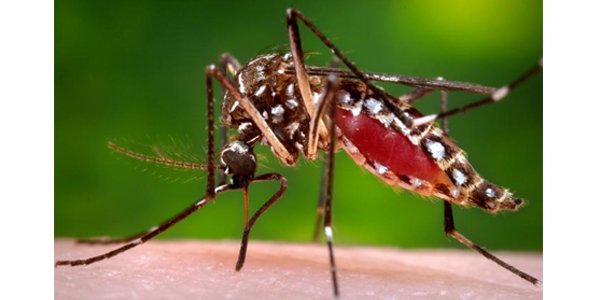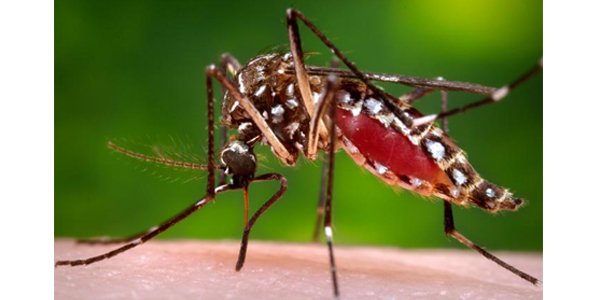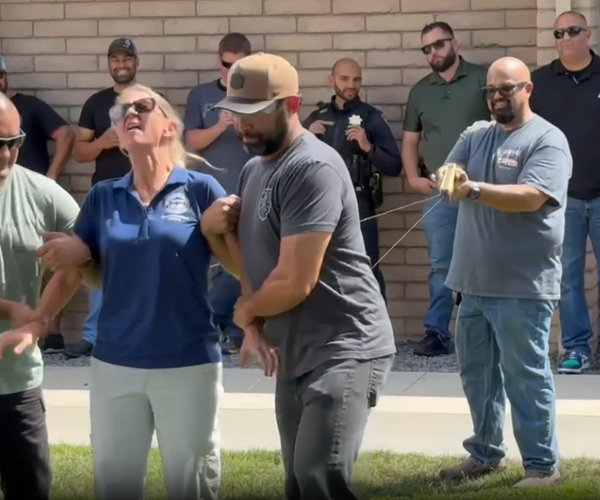If somebody from the San Joaquin Mosquito Vector and Control District knocks on your door this month, it might benefit you – and your health – to hear them out.
After the agency’s surveillance system detected that adult Aedes aegypti are proliferating rapidly throughout the county – specifically in the areas of South Stockton, Manteca, Escalon, and Ripon – efforts are underway to schedule and conduct in-person inspections at homes within the areas of concentration.
And if you aren’t home when they stop by in Manteca and Ripon this month – focusing on area in Manteca from Northgate Drive near the intersection with Main Street south to Joseph Road, where The Pub is located, and a square in Ripon bordered by Milgeo Avenue, North Ripon Road, Shasta Avenue, and Fulton Avenue – they’ll leave a door hanger with instructions on how to schedule an inspection to get a handle on the invasive and aggressive species that is also known as the “Yellow Fever Mosquito” and can also carry dengue fever, chikungunya virus, and the zika virus.
“We will leave door hangers at residents’ homes who do not answer the door. If you receive a door hanger, it is imperative to call us and schedule an inspection,” the agency wrote in a press release announcing the effort. “Our goal is to determine the extent of the invasive Aedes aegypti mosquito infestation.
“We ask that you please cooperate with our staff. This inspection is used to suppress this aggressive mosquito.”
Because of concerns about safety, the San Joaquin Mosquito and Vector Control District has clearly spelled out what their employees will be wearing when they arrive to perform an inspection – hoping to quell resident’s fears while employees are conducting the research and possible eradication that is necessary to curb the population boom among the disease-carrying mosquitoes.
“District personnel wear tan and green uniforms with our logo on the shirt. Each person will have a District-issued identification badge,” the agency wrote in its press release. “We urge residents to remove all standing water and unnecessary containers around their homes and report daytime biting mosquitoes to the District.”
While traditional mosquito populations are often active at dusk and dawn, the Aedes Aegypti is distinct in that it bites during the daylight hours as well – increasing the likelihood that somebody will come into contact with them if they are outdoors. Originally from Africa, the mosquito can now be found in tropical, subtropical, and temperate areas throughout the world – likely covering South America before working up through Central America and into Mexico before taking root in the United States.
Currently the mosquito is only being detected through the American South and the Southwest – leaving most of Nevada absent of detection while detection appears to stop in the Northern Sacramento Valley and along the backside of the Sierra Nevada range.
Those that are bit by a mosquito during the daytime are encouraged to contact the district and report the location where the bite occurred to help provide additional data to experts that are tracking the distribution of the mosquito throughout the county.
“Reporting daytime biting mosquitoes to the District is critical to suppressing this species, which can become quite a nuisance and a potential carrier of mosquito-borne disease,” said Aaron Devencenzi, the district’s public information officer.
While the mosquitoes that are currently being sought by the district are known to carry potentially lethal viruses in other parts of the world, there has yet to be a case of these specific mosquitoes carrying those diseases in San Joaquin County or in any of the samples collected throughout California.
While things like ornamental ponds, untreated pools, and large areas of standing water have long been known to produce prime reproductive conditions for mosquitoes, the Aedes aegypti will lay its eggs just above the water line in virtually any amount of water – from a water bottle cap to the overflow dishes under potted plants. And since eggs, once laid, can survive for up to 8 months without any actual water, the mosquitoes can actually reproduce after a long Central Valley summer – especially after an unexpected thunderstorm over the weekend dumped large amounts of water in certain parts of the county.
The district will be performing periodic adult and larval mosquito control efforts throughout the county between the hours of 3:30 and 5 a.m. Residents can find planned spray locations and times posted on the district’s website – www.sjmosquito.org – and can even sign up for spray notification alerts in their area by visiting the website. For additional information, call 209.982.4675.
To contact Bulletin reporter Jason Campbell email jcampbell@mantecabulletin.com or call 209.249.3544.






